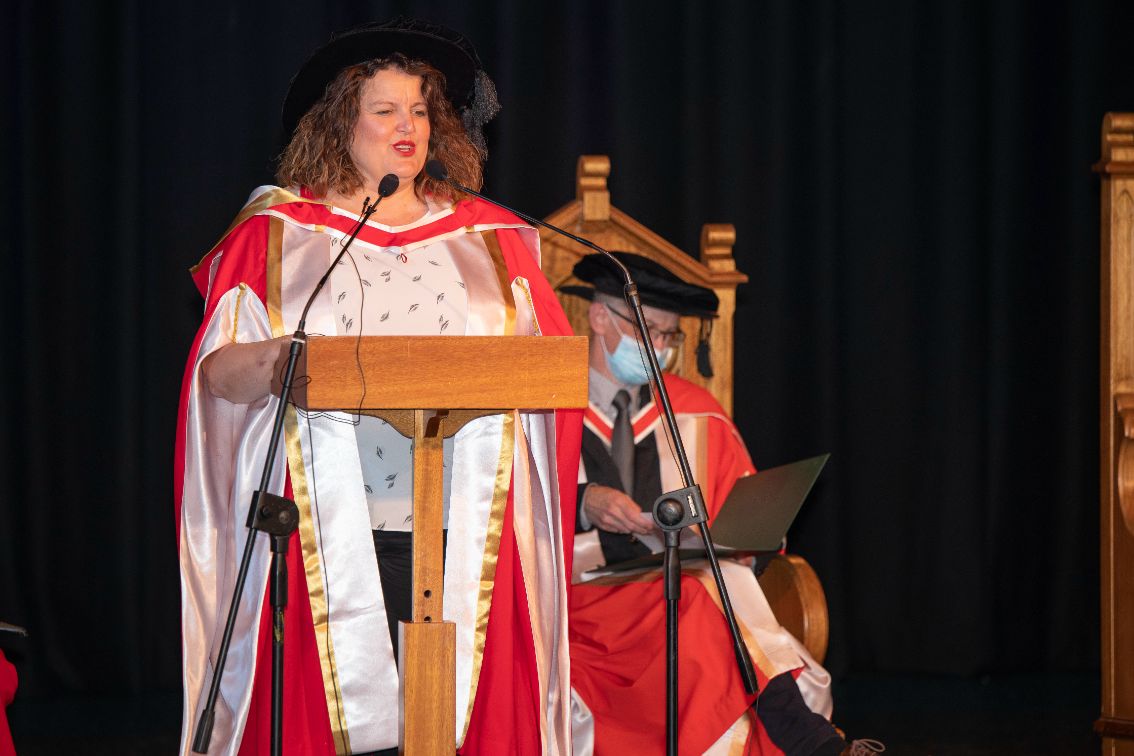Shelley Kinash knows a thing or two about students. She has been working in university education for nearly 30 years, in Canada and Australia, and has spoken to students from nearly every Australian university throughout her career.
And Professor Kinash – now UNE’s Executive Principal of Student Experience – says what higher education students want during and from their education is evolving in the wake of COVID.
“After more than two years living with a pandemic, people are craving connection, purpose, focus and hope,” she says. “Well-designed education can meet all these needs.”
Throughout her career, Professor Kinash has been a leader of learning and teaching across multiple universities. Improving student engagement and retention, she says, has never been more important.
“It’s not clear whether the Australian Government recognises universities as a national treasure and a mechanism for generating human capital and improving our global standing,” Professor Kinash says. “In the absence of such leadership, universities must find their own strength and focus, as a united industry.
“One way in which we can maintain momentum for our students, graduates, staff and communities is by adopting our own practice-based frameworks grounded in shared principles.”
Most students have more complex lives than previous generations of learners.
Professor Kinash has identified 10 principles that matter most in higher education today – principles that ensure students have an excellent experience and achieve their career goals.
1. Keep the focus on students
“Students and their experience should be mission-central for every university,” Professor Kinash says. “Universities exist to share and produce knowledge. Students should be considered as, and treated as, both the recipients and co-contributors of knowledge. Whether online or on-campus, students are vital – and valued – and should be acknowledged, nurtured, and heard.”
2. Support students’ priorities of assessment, learning and career development
“Coursework, and particularly assessment, are the fundamental elements of the university student experience,” Professor Kinash says. “Most students have more complex lives than previous generations of learners. Many are simultaneously maintaining jobs, families and financial matters and do not have time for extra, bolt-on activities. If they are going to participate in an activity, it is because it is part of their course-based assessment.”
3. The quality of teachers matters
“Students expect their teachers to be engaging, knowledgeable, supportive and passionate, and they expect teaching approaches to be interactive,” Professor Kinash says. “It takes a village to provide our students with an exemplar education. We need to clear as many of the learning roadblocks as we can. We need to respond to students helpfully and respectfully, answering their specific questions as quickly as possible.”
4. University staff must work in concert to support student success
“University staff hold important educational roles across the university – beyond directly teaching students – and must work in concert to support student success,” Professor Kinash says. “It is easy to get caught up in process. Evaluation is key to continuously improving the student experience, and the student voice is a critical component of evaluation. It is easy to shuffle students from department to department and from one service team to another, but then they fall between the cracks and drop out or fail out.”
5. Business systems must create smooth student journeys
“Mechanisms such as enrolment, advising, progression and fee-payment need to work smoothly so that students can put their energy into learning,” Professor Kinash says. “Many such functions tend to be clunky and error-prone. Information should be readily available and transparent. Student service team members are responsible for providing supportive help that is direct, responsive and timely.”
6. Employability is core to student ambition
“Career ambitions are the main reason why people choose university,” Professor Kinash says. “The curricula, teaching approaches and learning experiences need to be designed in ways that develop their employability and empower them for positive graduate outcomes. There are three primary ways universities can do this: by ensuring that the curriculum is relevant and fostering student employer/industry networks; being explicit about the ways in which the curriculum, teaching and assessment makes students employable; and through explicit employability strategies.”
7. Student cohorts have fluctuating and diverse expectations
“Students are diverse and one size does not fit all,” Professor Kinash says. “Equity means that students are not treated the same, but are given the individual supports they require to succeed. By listening to students, universities can provide bespoke responses.”
8. Learning journeys must be personal and authentic
“Diverse student journeys can and should be conceptualised as a metro-map with multiple entry and exit points, routes, pathways and station supports along that journey,” Professor Kinash says.
9. Student engagement is the threshold for learning
“Engagement requires reciprocal connection,” Professor Kinash says. “It means that students are fully present in the university experience and compelled to contribute to communities within and beyond it.”
10. Retention is more than whether a student stays
"For students to complete their degrees, needs associated with study (academic success), work, family and finances must be met,” Professor Kinash says. “Retention is everyone’s responsibility. Universities who report high retention rates support their students’ multiple needs.”
We recognise the importance of experiences that make their mark on students and enable those students to make their mark on the world.
In conclusion
“At UNE we are seeking to enhance and continuously improve the student experience, engagement and retention,” Professor Kinash says. “We recognise the importance of experiences that make their mark on students and enable those students to make their mark on the world. Thoughtful university education does both. At UNE, we understand that students want a transformative experience that will allow them to contribute to their communities, as much as to their careers.”


